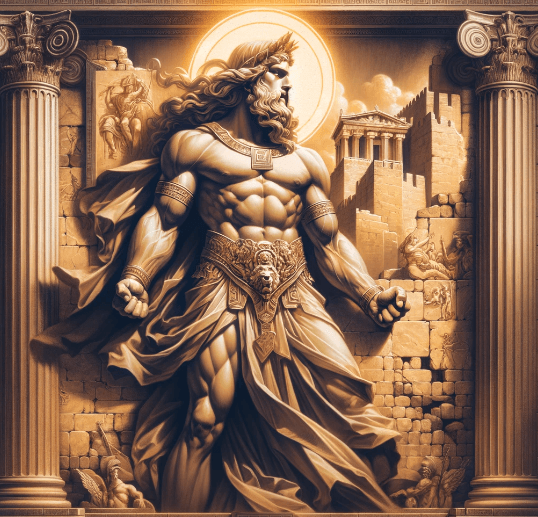Laomedon, an important figure in the legends of ancient Greek mythology, was the storied King of Troy, whose reign set the stage for the epochal events leading up to the Trojan War.
His lineage, as the son of Ilus, the founder of Troy, and Eurydice (or Leucippe, in some accounts), places him at the heart of Trojans’ ancestral narratives. Laomedon’s tenure as king is particularly noted for his interactions with the gods, which were a blend of assistance and conflict, highlighting the complex and often tumultuous relationships between the divine and mortals in Greek myths.
His narrative is rich with divine intervention, monumental architectural achievements, and a series of broken promises that would sow the seeds of Troy’s eventual destruction.
The Walls of Troy: A Divine Construction
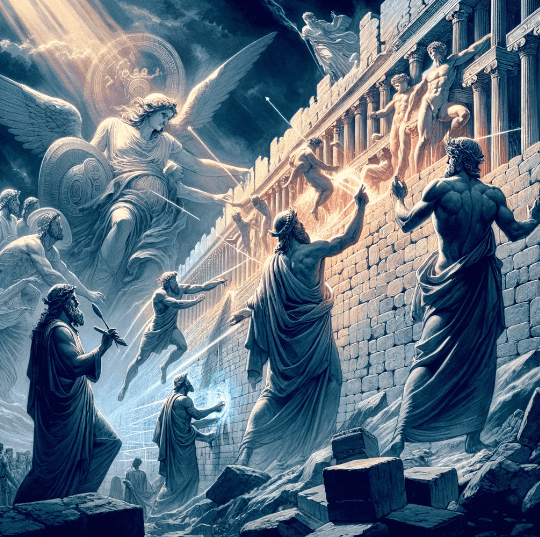
Laomedon’s era is perhaps best remembered for the miraculous construction of Troy’s walls, an endeavor that involved the gods themselves.
Apollo and Poseidon, temporarily stripped of their divinity as a punishment from Zeus, were compelled to serve Laomedon. With their divine powers, they erected walls that were both magnificent and impenetrable, symbolizing Troy’s grandeur and Laomedon’s ambition. However, Laomedon’s refusal to honor his promise of rewarding the gods with the agreed upon wages was a grave misstep.
This breach of faith provoked the ire of the gods, particularly Poseidon, who would later send a sea monster to ravage Troy’s coastline as retribution. This act of treachery by Laomedon against the deities who aided him underscores a recurring theme in Greek mythology: the dire consequences of failing to uphold promises to the divine.
Cetus and the Sacrifice of Hesione
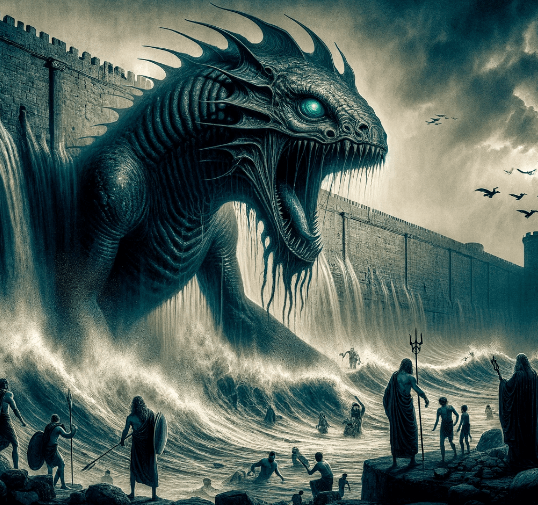
The story evolves with the advent of the sea monster, Cetus, unleashed by a vengeful Poseidon. The monster’s devastation across Troy’s coasts was not just a punishment for Laomedon’s deceit but also a divine statement against hubris towards the gods.
In an attempt to quell the monster’s fury and protect his kingdom, Laomedon was directed by an oracle to sacrifice his daughter, Hesione, to the beast. This moment is poignant, reflecting the often-tragic intersections between divine will and mortal destinies in Greek myths.
The eventual rescue of Hesione by Hercules, under the promise of receiving magical horses from Laomedon, adds layers to Laomedon’s character as a king who repeatedly fails to honor his word, attracting even further divine wrath and setting a cycle of betrayal and retribution into motion.
Hercules’ Revenge and the Fall of Troy
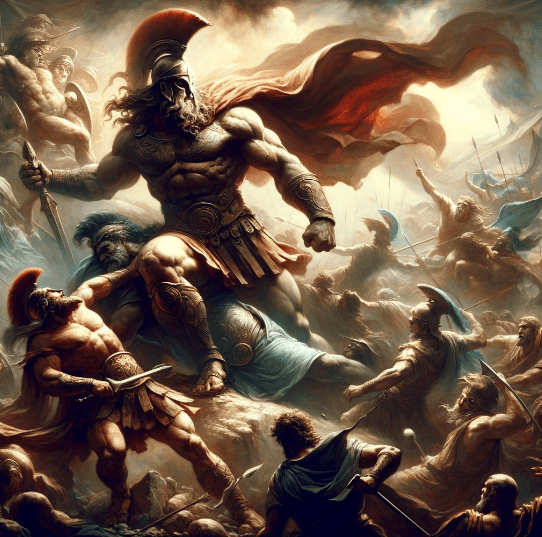
Hercules’ involvement with Laomedon marks a turning point in the king’s legacy. After rescuing Hesione and being denied the promised reward, Hercules’ wrath leads to a decisive siege against Troy.
The fall of Troy at Hercules’ hands, resulting in Laomedon’s death, foreshadows the city’s ultimate fate in the Trojan War. This episode is emblematic of the themes of honor and retribution that permeate Greek mythology.
Hercules’ revenge against Laomedon is not just a personal vendetta but a fulfillment of the moral and cosmic order that Laomedon had disturbed by dishonoring his commitments to both gods and men. It’s worth noting that Heracles’ sacking of Troy predates Homer’s accounts of the Trojan War.
Laomedon’s Family and Legacy
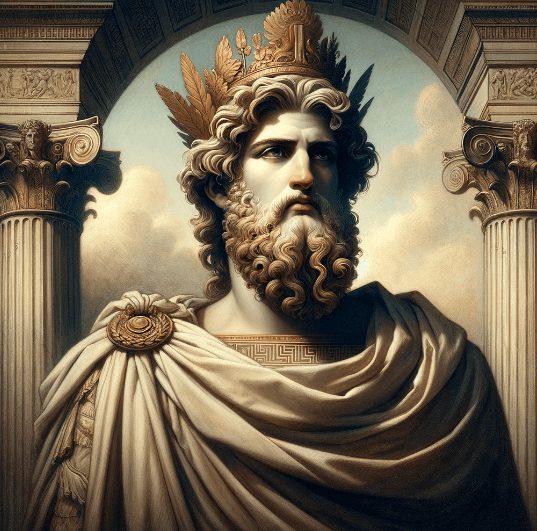
Laomedon’s legacy is a complex mix of ambition, divine entanglements, and flawed judgment. While his contributions to Troy’s architectural majesty cannot be understated, his failures in upholding promises cast a long shadow over his reign and foreshadow the tragic events that would later engulf Troy.
Laomedon was a member of the royal line of Troy, being the son of Ilus, the founder of Troy, and Eurydice or, according to some versions, Leucippe.
Laomedon’s legacy is intricately tied to his children, who were numerous. Among his most notable offspring were:
- Priam
Perhaps the most famous of Laomedon’s children, Priam would succeed him as King of Troy and become a central figure in the Trojan War saga. Priam’s reign and its tragic end marked the culmination of the curse that seemed to hang over Laomedon’s lineage, leading to the eventual fall of Troy.
- Hesione
Her story is deeply entwined with the themes of sacrifice and redemption that recur in Greek mythology. Hesione was offered as a sacrifice to the sea monster Cetus but was saved by Hercules. This act of heroism, and Laomedon’s subsequent deceit towards Hercules, set off a chain of events that would lead to Hercules’ raid on Troy.
Another significant figure, Tithonus was granted immortality but not eternal youth by Zeus at the behest of Eos, the dawn goddess who loved him. His tale is a poignant reminder of the mixed blessings of the gods and the tragic outcomes of their favors.
- Podarces
Lesser known but equally integral to the Trojan lineage, Podarces would later be known as Priam, a name change that signified his new beginning as the king following his brother’s death and the sacking of Troy by Hercules. This transition underscores the resilience of Laomedon’s lineage despite the adversities faced.
The tales of Laomedon’s children highlight the themes of heroism, betrayal, divine wrath, and redemption that are central to Greek mythology. Each story, whether it ends in tragedy or salvation, reflects the complex relationships between gods and mortals, and the often-heavy price of divine interaction.
Get in Touch
Thank you for reading our article about Laomedon, the legendary King of Troy. We hope this exploration into his reign, marked by divine interactions, has provided a richer understanding of his role within ancient Greek mythology. If this journey through the myths and legends of Troy has captured your interest, you might also enjoy delving into the stories of the Anemoi, the gods of the winds.
Should you have any questions about Laomedon, his mythological context, or any other figures from the ancient world, please don’t hesitate to contact me at richard@mythologyplanet.com, or share your thoughts and questions in the comment section below.
For those keen on exploring more about Laomedon, we recommend watching this informative YouTube video by VIS MYTH.
